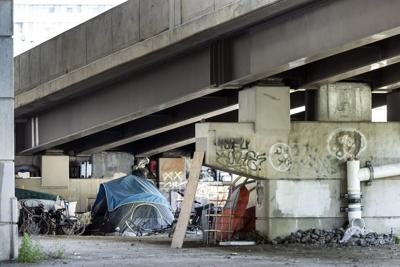Ever walk through an encampment? The hopelessness and despair you likely felt may eventually be compounded by a sense of shame in response to Bill 6, the Safer Municipalities Act.
As of June 5, it gave police the authority to dismantle encampments, levy fines of up to $10,000 and threaten imprisonment for up to six months. But instead of offering a solution, Bill 6 simply shifts homelessness to an alternate location.
Let’s be clear: People living in encampments have no other place to go. Ontario offers less than half of the supportive housing units needed.
Toronto is among the world’s wealthiest cities, yet as of last fall, 81,515 Ontarians had no home. That’s an increase of 25 per cent in just two years. Half were homeless for over six months, including up to 2,000 youth. It’s a bad situation that will get worse: An economic downturn is expected to leave a staggering 300,000 Ontarians unhoused.
Homelessness and misery are bedfellows. Unhoused people suffer higher rates of chronic illnesses, schizophrenia and mood, personality and substance use disorders compared to those with a home. They also endure higher rates of theft, assault, sexual assault, stabbing and shooting.
The health-care costs for unhoused people are six times higher than those of housed individuals, even after accounting for health history. Clearing encampments only increases the risk that medications and other belongings will be lost or thrown out.
It’s no wonder that people living without a home die far sooner. A woman typically perishes five decades earlier, succumbing at the age 36 instead of 85. Men typically die at 50 instead of 78. It’s unclear how many are “deaths of despair” — fatalities resulting from suicide, drug overdose or substance use. A Toronto study found that homelessness raised the risk of suicide tenfold over the housed population.
Supportive housing is 22 times less expensive than a hospital bed, seven times less expensive than a prison cell and three times less expensive than a shelter bed. These “alternatives” also fail to address the underlying reasons why people are unhoused. Once discharged from these stopgap measures, people are left to fend for themselves with minimal community support. It’s only a matter of time before the cycle restarts, only with the further trauma and health declines that result from their ongoing homelessness.
St. Michael’s Hospital in Toronto is trying to break the cycle of repeated hospitalizations by assigning a navigator to help find housing for unhoused patients. Two-thirds of the 1,000 patients served by the program so far were connected to a family doctor. While promising, it only scratches the surface of Ontario’s gargantuan need.
The cost of ending Ontario’s chronic homelessness over the next decade is estimated at $11 billion. That would cover housing, supportive services and enhanced prevention programs. An additional $2 billion over eight years could largely eliminate encampments. Expensive as this is, these costs need to be compared to the staggering financial, social, physical and mental price paid for homelessness.
Yet, Ontario has turned a blind eye to the harsh medical realities faced by people without homes. Rather than addressing its underlying causes, Bill 6 promises to dismantle encampments and offer few alternatives, even though living collectively within an encampment is safer than living alone.
Police armed with threats of violence, fines and incarceration are not the solution to homelessness, but a direct challenge to an unhoused person’s right to “life, liberty and security of the person” guaranteed by Canada’s Charter of Rights and Freedoms.
Encampments of unhoused people will always trigger hopelessness and despair, but Bill 6 adds deep shame to the mix. It’s patently clear that Ontario cannot harass, punish or arrest its way out of homelessness. Addressing it in a meaningful way starts with compassion and vision. It culminates in an informed strategy to adequately fund what’s truly missing — supportive housing and social assistance programs.
Error! Sorry, there was an error processing your request.
There was a problem with the recaptcha. Please try again.
You may unsubscribe at any time. By signing up, you agree to our terms of use and privacy policy. This site is protected by reCAPTCHA and the Google privacy policy and terms of service apply.
Want more of the latest from us? Sign up for more at our newsletter page.





























To join the conversation set a first and last name in your user profile.
Sign in or register for free to join the Conversation